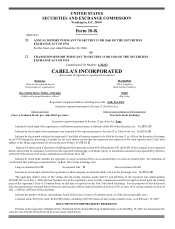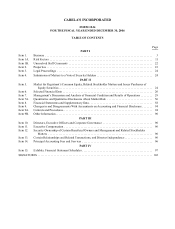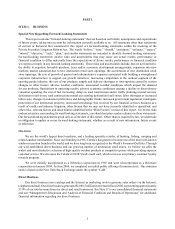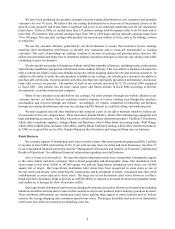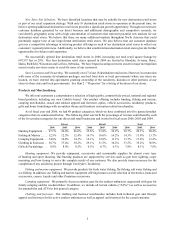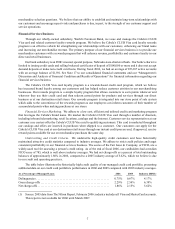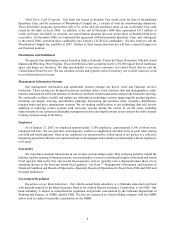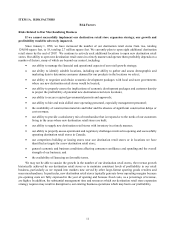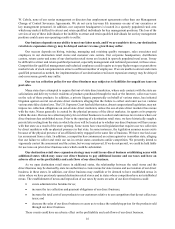Cabela's 2006 Annual Report Download - page 13
Download and view the complete annual report
Please find page 13 of the 2006 Cabela's annual report below. You can navigate through the pages in the report by either clicking on the pages listed below, or by using the keyword search tool below to find specific information within the annual report.9
Our bank subsidiary does not qualify as a “bank” under the Bank Holding Company Act of 1956, as amended,
or the BHCA, because it is in compliance with a credit card bank exemption from the BHCA. If it failed to meet
the credit card bank exemption criteria, its status as an insured depository institution would make us subject to
the provisions of the BHCA, including restrictions as to the types of business activities in which a bank holding
company and its affiliates may engage. We could be required to either divest our bank subsidiary or divest or cease
any activities not permissible for a bank holding company and its affiliates, including our direct and retail businesses.
While the consequences of being subject to regulation under the BHCA would be severe, we believe that the risk of
being subject to the BHCA is minimal as a result of the precautions we have taken in structuring our business.
There are various federal and Nebraska law regulations relating to minimum regulatory capital requirements
and requirements concerning the payment of dividends from net profits or surplus, restrictions governing transactions
between an insured depository institution and its affiliates, and general federal and Nebraska regulatory oversight
to prevent unsafe or unsound practices. At the end of 2006, our bank subsidiary met the requirements for a “well
capitalized” institution, the highest of the Federal Deposit Insurance Corporation Improvement Act’s (“FDICIA”) five
capital ratio levels. A “well capitalized” classification should not necessarily be viewed as describing the condition
or future prospects of a depository institution, including our bank subsidiary.
FDICIA also requires the FDIC to implement a system of risk-based premiums for deposit insurance pursuant
to which the premiums paid by a depository institution will be based on the probability that the FDIC will incur a
loss in respect of that institution. The FDIC has since adopted a system that imposes insurance premiums based upon
a matrix that takes into account an institution’s capital level and supervisory rating.
Subject to certain limitations, federal bank agencies may also require banking organizations such as our bank
subsidiary to hold regulatory capital against the full risk-weighted amount of its retained securitization interests. We
understand that these federal bank agencies continue to analyze interests in securitization transactions under their
rules to determine the appropriate capital treatment. Any such determination could require our bank subsidiary to
hold significantly higher levels of regulatory capital against such interests.
The activities of our bank subsidiary as a consumer lender also are subject to regulation under the various
federal laws, including the Truth-in-Lending Act, the Equal Credit Opportunity Act, the Fair Credit Reporting Act,
the USA Patriot Act, the Fair and Accurate Credit Transactions Act of 2003, the Community Reinvestment Act,
the Service members’ Civil Relief Act and the Gramm-Leach-Bliley Act (“GLB”), as well as various state laws.
The Truth-in-Lending Act requires disclosure of the “finance charge” and the “annual percentage rate” and certain
costs and terms of credit. The Equal Credit Opportunity Act prohibits discrimination against an applicant for credit
because of age, sex, marital status, religion, race, color, national origin or receipt of public assistance. The Fair Credit
Reporting Act establishes procedures for correcting mistakes in a person’s credit record and generally requires that
the records be kept confidential. The USA Patriot Act, among other things, regulates money laundering and prohibits
structuring financial transactions to evade reporting requirements. The Community Reinvestment Act requires
federal agencies to encourage depository financial institutions to help meet the credit needs of their communities. The
Service members’ Civil Relief Act provides for temporary suspension of legal proceedings and financial transactions
that may adversely affect the civil rights of service members during military service. We spend significant amounts
of time ensuring we are in compliance with these laws and work with our service providers to ensure that actions they
take in connection with services they perform for us are in compliance with these laws. Depending on the underlying
issue and applicable law, regulators are often authorized to impose penalties for violations of these statutes and, in
some cases, to order our bank subsidiary to compensate injured borrowers. Borrowers may also have a private right
of action to bring actions for some violations. Federal bankruptcy and state debtor relief and collection laws also
affect the ability of our bank subsidiary to collect outstanding balances owed by borrowers. The GLB Act requires
our bank subsidiary to disclose its privacy policy to customers and consumers, and requires that such customers and
consumers be given a choice (through an opt-out notice) to forbid the sharing of non-public personal information
about them with non-affiliated third persons. We have a written Privacy Notice posted on our website which is
delivered to each of our customers when the customer relationships begin, and annually thereafter, in compliance
with the GLB Act.
Taxation Applicable to Us. We pay applicable corporate income, franchise and other taxes, to states in which
our destination retail stores are physically located. Upon entering a new state, we apply for a private letter ruling from
the state’s revenue department stating which types of taxes our direct and retail businesses will be required to collect




